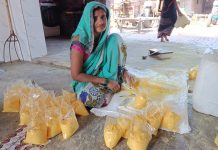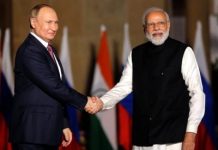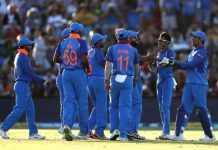
Director: Vishal Bhardwaj
Starring: Imran Khan, Pankaj Kapur, Anushka Sharma, Shabana Azmi
LAST WEEK, TEHELKA Special Correspondent Sunaina Kumar wrote that Matru ki Bijlee ka Mandola represented a crucial moment in the career of Vishal Bhardwaj, amongst murmurings that he had begun to buy into his own hype and lost the “purity of intent” of his earlier films. That moment has now passed, and the jury is still out on whether his legacy has been rescued after the misstep of 7 Khoon Maaf. Personally, I didn’t think that film was as bad as it was made out to be, and that Matru, while in many ways a flawed film that does not answer the questions about its director “selling out”, is a well-intentioned and rather well-executed experiment that achieves a fairly basic function of popular cinema: it entertains.
Yet, Matru is by no means mindless in its entertainment. A madcap comedy in the tradition of Fellini and Kusturica, Bhardwaj sets his film in the Haryanvi village of Mandola, named after its local satrap (Kapur), whose grand plans of converting the village’s fertile lands into a large SEZ has the villagers up in arms. A mysterious stranger called Mao (which leads to several unfortunate jokes about people saying “Mao Mao” later in the film) has declared war on the oppressor, but he finds an unlikely ally: Mandola himself, albeit only when he is nice and sloshed. Mandola leads a protest march against himself, but before he can switch roles and hand the land back to the villagers, he manages to fall into a swimming pool, losing his buzz and revolutionary spirit. He greets the expectant protesters with a shotgun and the great revolt fizzles out. He tries to quit drinking, but faces the impediment of his brain hallucinating pink buffaloes when starved of its beloved Gulabo beer. Mao, who turns out to be Matru (Khan), Mandola’s Man Friday and drinking buddy, keeps up the fight against Mandola and Chaudhari Devi (Azmi), in a series of manoeuvres and countermanoeuvres that actually leaves you guessing until very close to the manic end.
The jokes are generally hit-andmiss, but the smart writing helps, indicating all is well with Bhardwaj the writer
With the very political nature of the main plot, one would expect Bhardwaj to be in his element with political satire. In Badal, Chaudhari Devi’s son, who forms, with Bijlee (Sharma), the power couple in love who will join the families, he has his best outlet for political vitriol. The annoying überbrat is the butt of many an attempt at capturing satirical gold, some of them not as successful as others. The elders’ bemused looks when he suggests destroying the inconvenient crops that make forcibly acquiring the land political suicide are priceless. Azmi chides him later, saying that Rahul, Sachin and Sandeep are responsible people, unlike him. But there is also the Zulu tribe that he buys for his fiancée, an awkward two minutes that thankfully lead to the coining of the Meena Kumari concept. But the jokes are generally hit-and-miss (and sadly, more miss than hit). The smart writing helps, indicating all is well with Bhardwaj the writer, at least when the faux Haryanvi accents don’t garble all meaning out of it. As for Bhardwaj the storyteller, he tells a fairly conventional story (not that there are too many peasant uprising films being made, but it is treated as a standard good-versus-bumbling- evil) in a decidedly unconventional way.
Ajachi Chakrabarti is a Correspondent with Tehelka.
ajachi@tehelka.com













